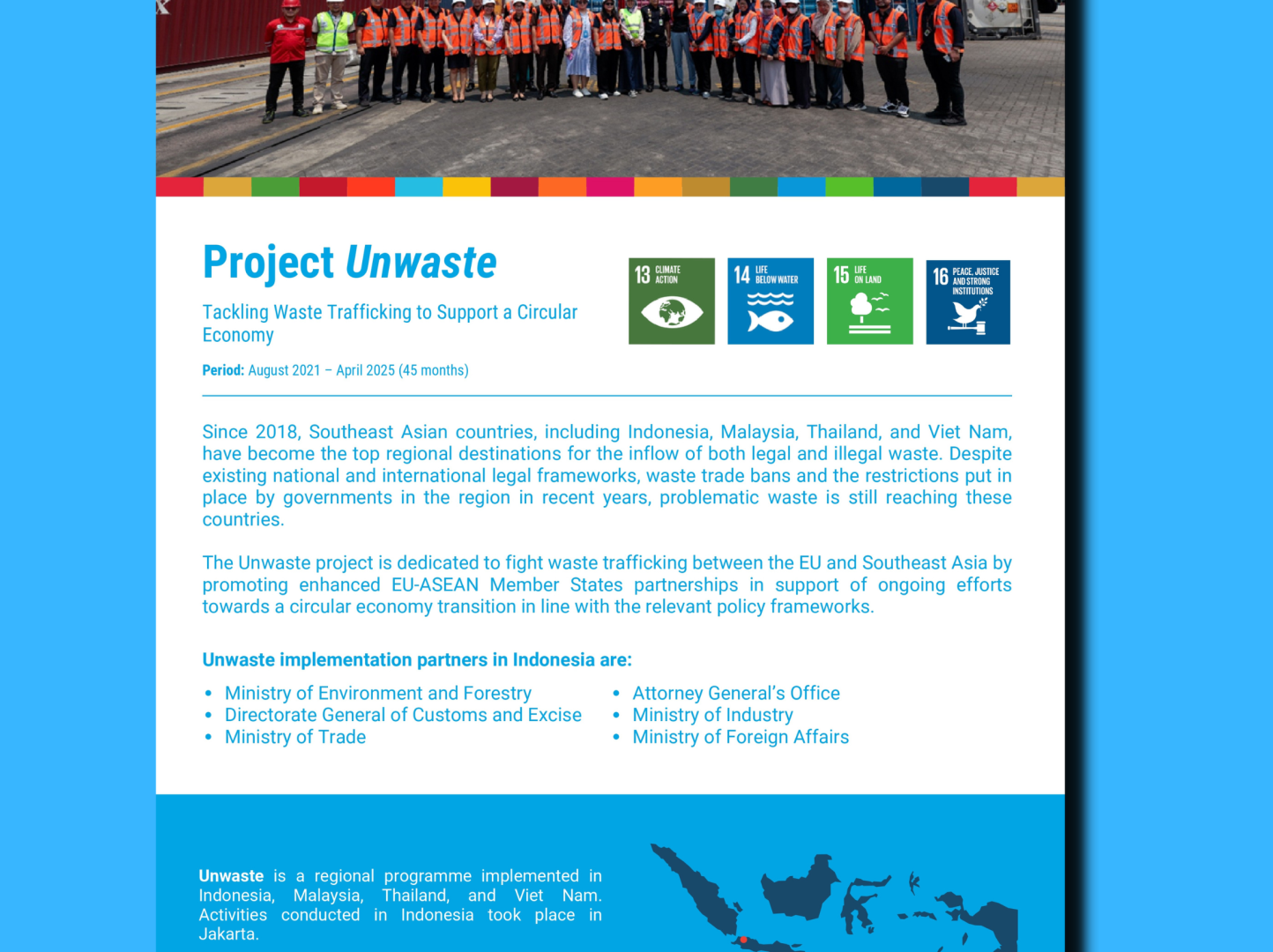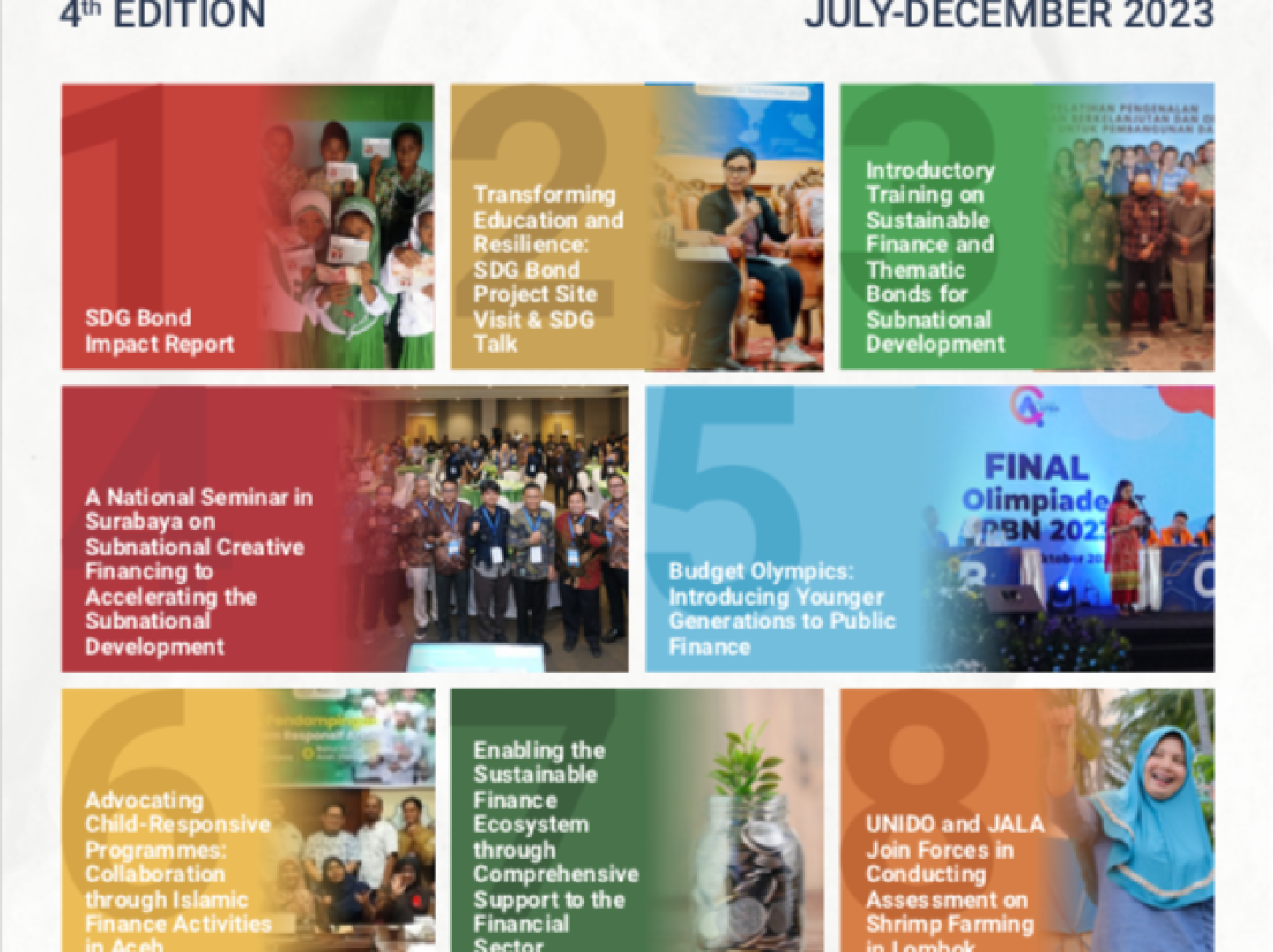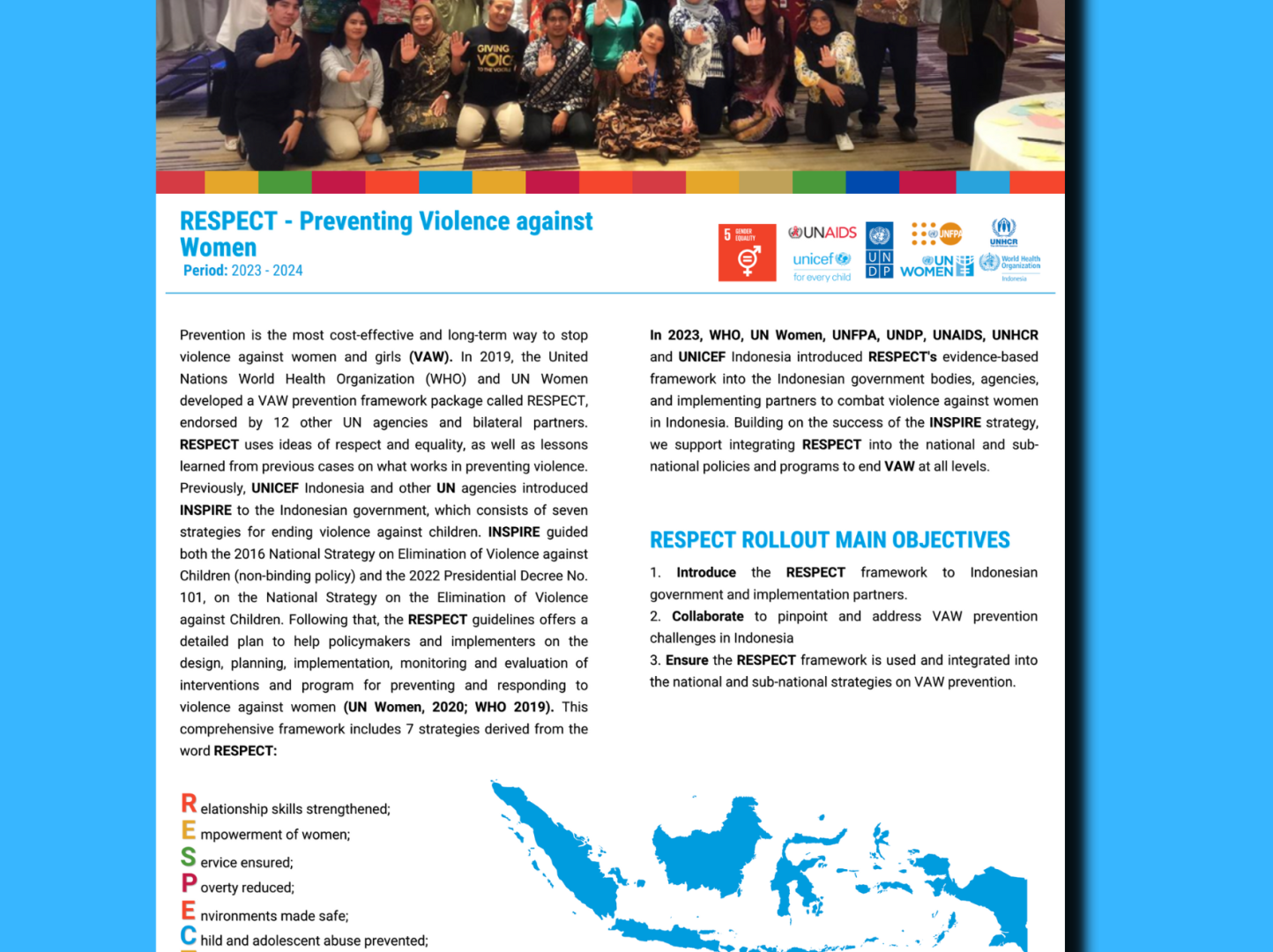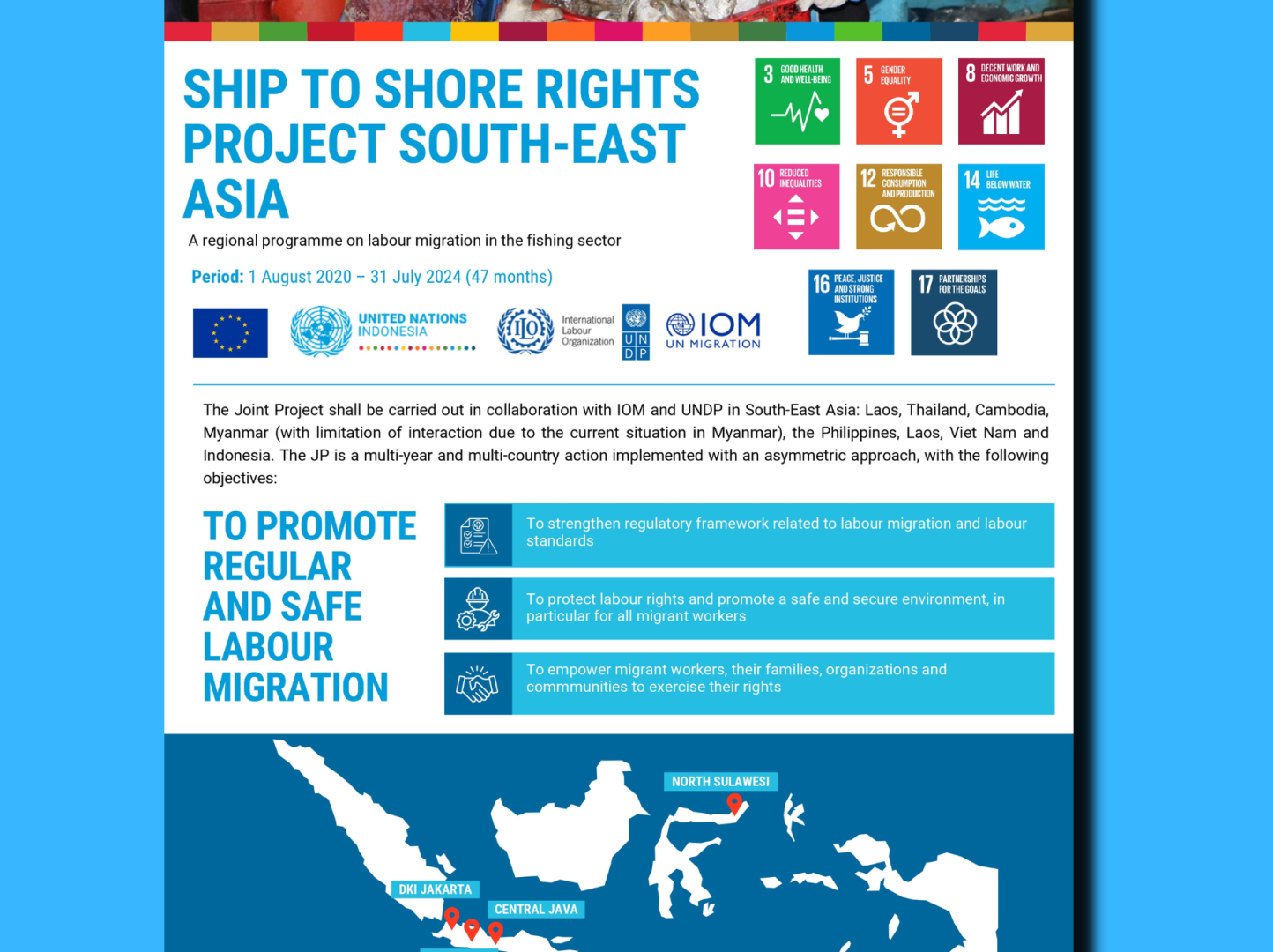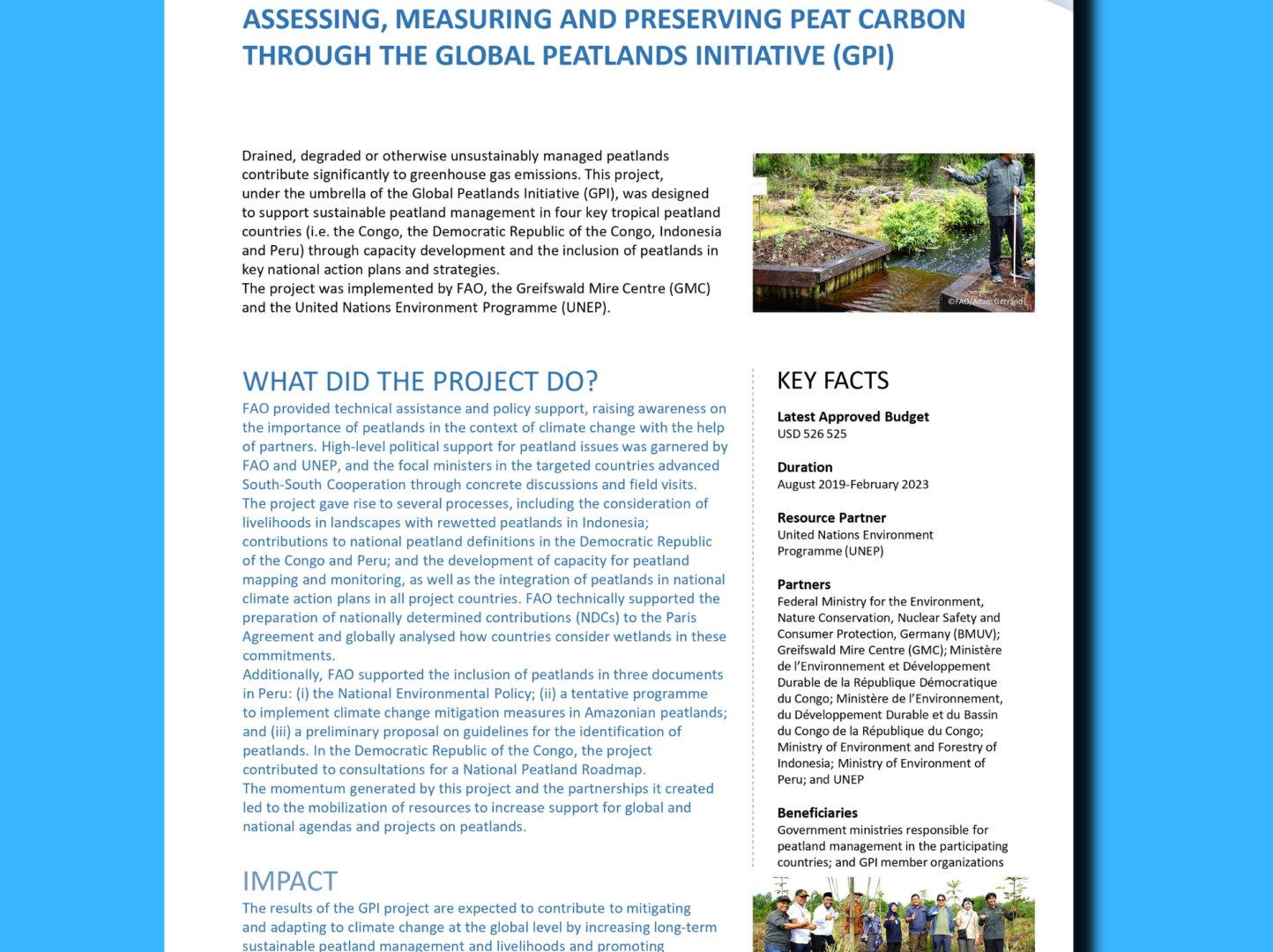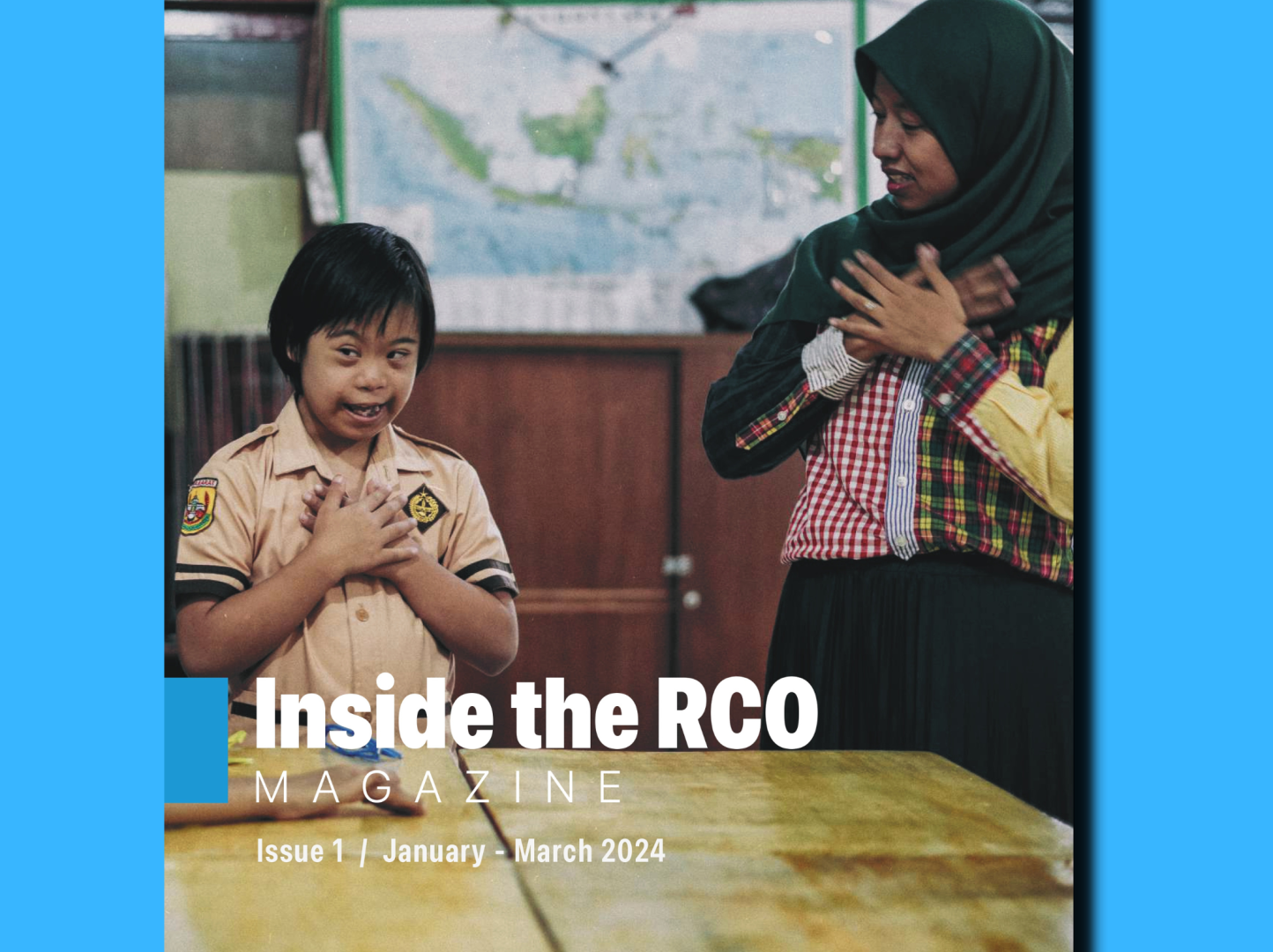Latest
Speech
18 February 2025
Launch of Asia and the Pacific SDG Progress Report 2025 - Resident Coordinator's Speech, Gita Sabharwal
Learn more
Story
17 February 2025
Boost road safety for people, planet and prosperity
Learn more
Speech
13 February 2025
National multi-stakeholder kick-off meeting Indonesia eTrade Readiness Assessment - Resident Coordinator's Speech, Gita Sabharwal
Learn more
Latest
The Sustainable Development Goals in Indonesia
The United Nations is committed to working with the Government of Indonesia to building a nation that is prosperous, democratic, and just, where development benefits all people, and where the rights of future generations are protected. True to the promise of the SDGs to “leave no one behind”, the UN’s approach combines a strong focus on the poorest of the poor, combatting discrimination and rising inequalities and addressing their root causes. “Leaving no one behind” means prioritizing people’s dignity and placing the progress of the most marginalized and vulnerable communities first. This central and transformative promise has become more important than ever to address the impacts of the COVID-19 pandemic and work towards a sustainable, resilient, and inclusive recovery.
Publication
07 October 2024
United Nations in Indonesia Country Results Report 2023
As the 2030 deadline for achieving the Sustainable Development Goals (SDGs) draws near, intensified collaboration between the Government of Indonesia and the United Nations is key in accelerating progress towards the SDGs. This report highlights the collective efforts of the government and the UN not only to meet the SDG targets but also to explore innovative solutions in financing, data collection, and the integration of advanced technologies for monitoring progress.This report encapsulates the dynamic partnership between Indonesia and the UN, emphasizing key achievements under the United Nations Sustainable Development Cooperation Framework (UNSDCF). From advancing inclusive human development to promoting green initiatives and innovation, our joint work aligns closely with Indonesia’s national development priorities. For a comprehensive look at the UN's initiatives and Indonesia's progress towards the SDGs, please download the full report available below., filtered_html
1 of 4
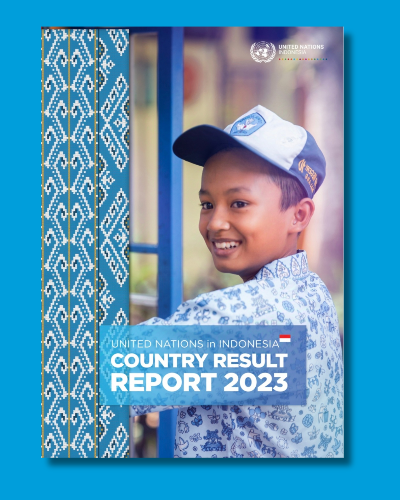
Publication
07 June 2023
Better Sexual and Reproductive Health and Rights for All in Indonesia (BERANI) Programme Fact Sheet
The Government of Indonesia, UNFPA, and UNICEF have been working together through the Better Sexual and Reproductive Health and Rights for All in Indonesia (BERANI) Programme from 2018 to 2023. This joint effort aims to improve sexual and reproductive health and rights for women and young people across the country.
Under the BERANI Programme, several key areas have been focused on, including enhancing midwifery education and regulation, strengthening partnerships to improve family planning, providing youth-friendly sexual and reproductive health services and information, strengthening the health sector's response to gender-based violence, and community outreach and empowerment.
Throughout the programme, significant achievements have been made. Over 20 policies, advocacy strategies, and roadmaps were developed to promote sexual and reproductive health and rights. Midwifery education centers have implemented high-quality standards, leading to increased pass rates in national competency exams. Private clinics have been strengthened to provide quality youth-friendly services, and community health centers have been capacitated to respond effectively to gender-based violence.
Additionally, a considerable number of young people have benefited from the programme. Thousands of adolescents have received comprehensive sexuality education and information on menstrual hygiene management. Digital content creators have been trained to develop sexual and reproductive health-related content, reaching a combined audience of over 600,000 young people.
The BERANI Programme highlights the commitment to leaving no one behind, ensuring that all individuals, regardless of their background, have access to comprehensive sexual and reproductive health services and information. The BERANI fact sheet is downloadable through the button below this article.
#BERANI #ReproductiveHealth #GenderEquality
, filtered_html
1 of 4
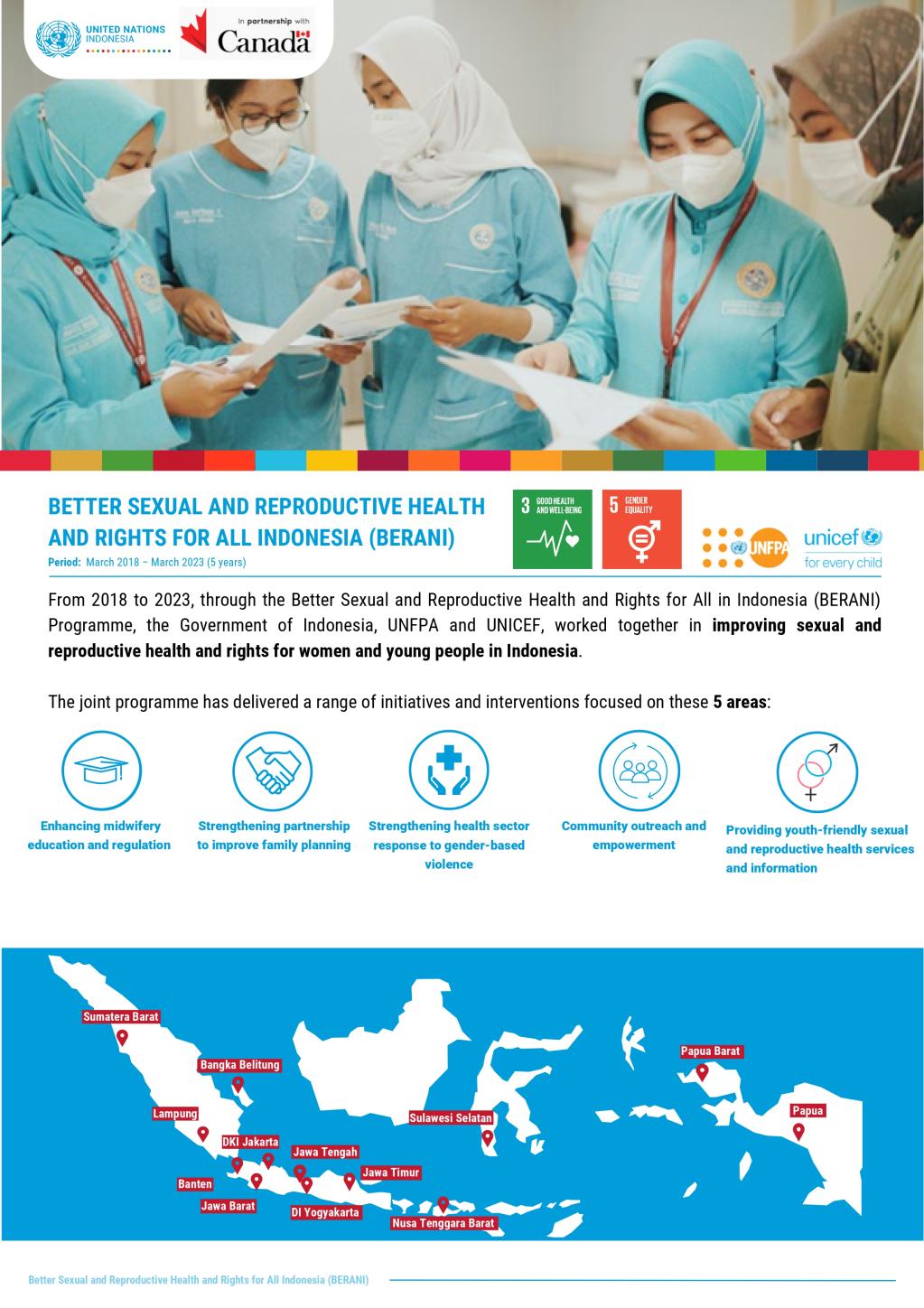
Story
29 May 2023
Baristas behind bars: From serving time to serving lattes
Perfectly foamed milk. A delicate butterfly enswirled atop. A bittersweet tang on the palate. A perfect cappuccino? It is beyond that. This particular cup was masterfully frothed and served by Denny, an inmate in Tangerang, west of Jakarta, who joined a UN-supported training programme to help prisoners to re-integrate into society after serving time.
“I want to make the most of my time, even in prison, and this training should help me find a job later,” said Denny, 31, who has just over two years left of a five-year prison sentence. “Of course, I knew how to make a coffee before, but here I am learning about different flavours, smells and aromas, and about the artistic side of coffee making.”
Denny is one of 200 inmates in the Tangerang Class IIA Correctional Facility and among more than 35,000 inmates across Indonesia who are involved in vocational training, from eco-printing on textiles to farming. While learning how to be a barista behind bars, he said he hopes to get a job in a café following his release.
Salis Farida Fitriani, who heads the correctional facility, said the programme aims at building a better future, but skills training alone is not enough for inmates to succeed in the outside world.
To deal with a society that often stigmatizes them for life, she said, the prison offers training in personality development, counselling, and religious teaching.
“Our goal is to provide positive activities and training for the inmates,” she said. “The programme includes personality development as well as vocational training to help with their future livelihoods.”
Breaking the ‘ex-con’ stigma
Starting a business is hard after serving time in prison, said Haswin, a 32-year-old former drug offender. Leaving the Tangerang correctional facility in January 2022, he now operates his own coffee shop, mixing modern and traditional coffee styles alongside mocktails and snacks.
“Life is so much better now,” said Haswin, adding that his former bartending job was a prime factor in his involvement with drug-related offences that led to his arrest in 2018.
“I am more content with life and proud of my creativity,” he explained. “I had never thought I could find a career outside nightlife.”
Now, his work is not just a “means to make ends meet”, but a new opportunity.
“I want to break the stigma around ‘ex-cons’ by showing that former offenders can also be independent and creative,” he said.
From sports to university programmes
Tangerang Class IIA gives prisoners a chance to do that. They can also compete in professional sports at Tangerang, a prison unique in Indonesia for offering a full university education programme. Open to prisoners across Indonesia, a pilot programme currently serving 200 inmates is poised to roll out countrywide, subject to funding, Ms. Fitriani said.
Asep, a third-year Islamic studies student with Syekh Yusuf Islamic University, said he, like many in the programme, could not afford to go to university in his life before prison.
“I was always keen to learn, but my economic situation did not make it possible for me to study,” he said.
Following the same curriculum the university offers to its regular students, Asep and his schoolmates attend classes thrice weekly for six hours each day. After graduation and before the end of his prison sentence, Asep said he hopes to help his fellow prisoners by offering religious counselling.
“I get to learn a lot about the world and about life outside,” he said. “It helps me cope better with my long sentence. It will help the others, too.”
Tailored to inmates’ needs
Supported by the UN Office on Drugs and Crimes (UNODC), the training programmes are designed with help from a set of assessment tools that provide evidence-based approaches tailored to inmates’ individual needs.
Corrections officers use these tools to evaluate and better understand inmates, including the level of security risk they may pose, their compatibility with the programme, and their likely response to education.
Within UNODC’s prisoner rehabilitation initiative, which focuses on education, vocational training, and employment during incarceration, the goal is to contribute to the prisoners’ employability after release, thus reducing chances of recidivism.
With this in mind, the agency partnered with Indonesia’s Directorate-General of Corrections to create an assessment matrix that helps corrections officers to build psychological and security profiles of prisoners and enables staff to keep track of their progress, said Rabby Pramudatama, a programme manager at UNODC’s Jakarta office.
“We need to make sure, for instance, that we get inmates who are unlikely to disturb the classes and will cooperate with teachers and their fellow students,” he said.
Second chances
UNODC also collaborates and supports such non-governmental organizations as Second Chance, which help inmates to reintegrate into society once they are out of the facility.
On a quiet morning, some inmates were reviewing verses from the Quran, while others gathered around to watch a pair of sparring kickboxers. As rain set in, they spoke of the sunshine that was bound to break through, sooner or later.
For Denny, he said the sunshine will come on the day when he, too, can get out and find a job.
“My main drive right now is to be a better person than I was before,” he said, adding that until that day, he will focus on religious activities and brewing perfect cappuccinos in barista classes.
Learn more about how UNODC is helping to reform prisons across the world here.
This article was initially published by UN News in this link: https://news.un.org/en/story/2023/06/1137212
, filtered_html
1 of 4

Publication
30 May 2023
UN in Indonesia Newsletter 2023 Volume 1
We are pleased to present the first edition of the UN in Indonesia Newsletter for the year 2023. This newsletter provides an overview of the significant work carried out by the United Nations in Indonesia from January to April, highlighting our commitment to sustainable development and inclusivity.
In this edition, our focus is on SDG 17: Partnerships for the Goals. By fostering strong collaborations and partnerships between governments, private sector, and civil society, we aim to accelerate progress towards achieving the Sustainable Development Goals (SDGs) and creating a better future for all.
Through the newsletter, we strive to bring the United Nations closer to the people we serve, ensuring that no one is left behind in our pursuit of sustainable development. It features inspiring stories from various UN agencies in Indonesia, showcasing their remarkable initiatives and efforts in promoting inclusivity and advancing sustainable development goals.
One of the featured projects in this edition sheds light on the vocational training program at the Tangerang Class IIA Correctional Facility. With the support of the UN Office on Drugs and Crime (UNODC), this program equips prisoners with essential skills to facilitate their successful reintegration into society after completing their sentences. It exemplifies our commitment to empowering individuals and contributing to positive social change.
As we navigate the post-pandemic era, it is imperative that we make up for the lost time and expedite our efforts towards achieving the SDGs. By strengthening our collective impact and forging new pathways, we can create a more sustainable and inclusive world for present and future generations.
You can access the downloadable newsletter in both English and Bahasa Indonesia below of this page.
Together, let us make a lasting difference and work towards a world where everyone can thrive.
, filtered_html
1 of 4
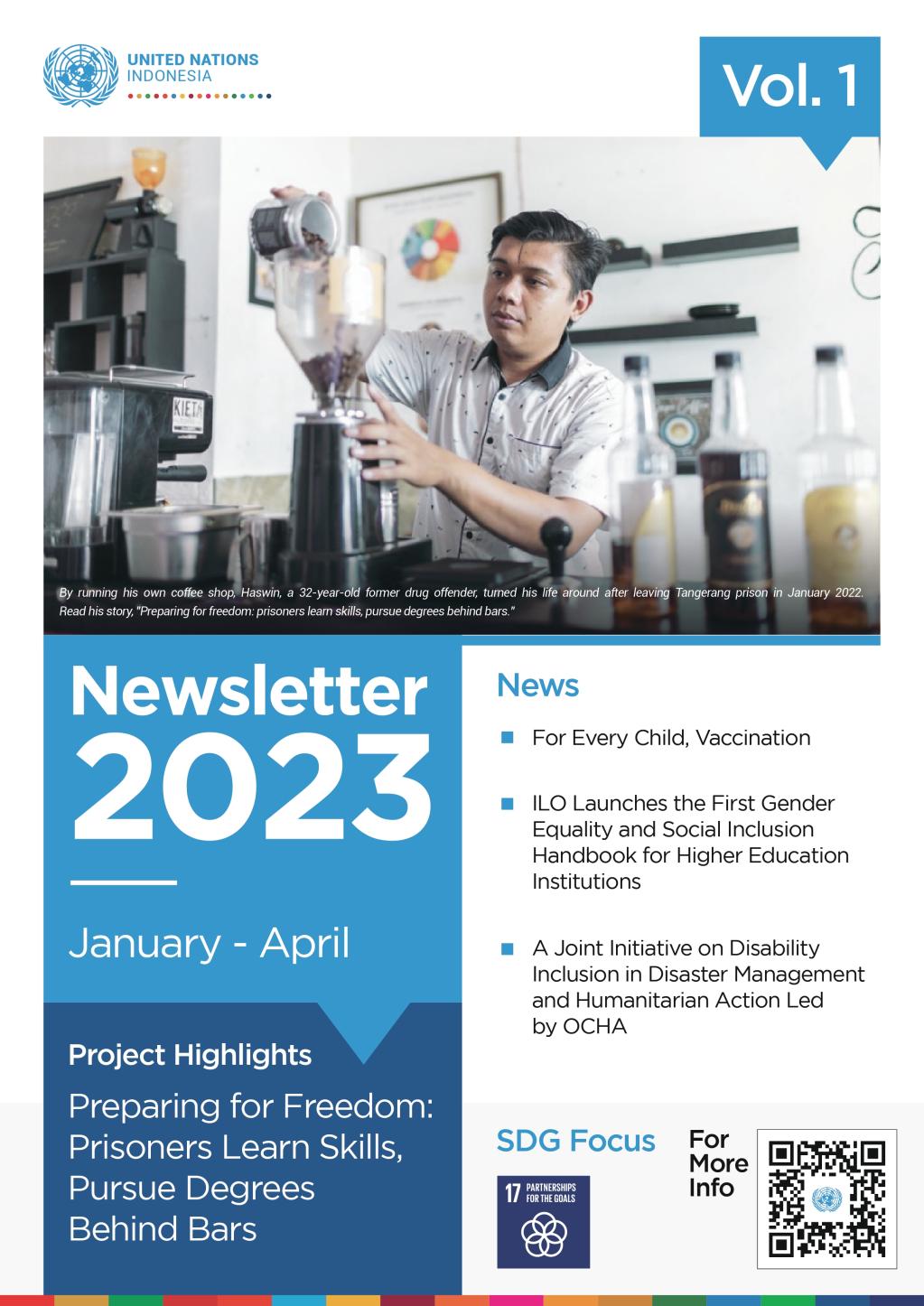
Story
17 February 2025
Boost road safety for people, planet and prosperity
If you had to guess the leading cause of death for children and young people globally, what would you say? Malaria? Pneumonia? Suicide? They’re all up there, but no, it’s road crashes. Cars have been around for over 120 years, and we know how to prevent these tragedies. Yet road crashes still claim more than two lives every minute, and nearly 1.2 million lives every year. If these deaths were caused by a virus, it would be called a pandemic and the world would scramble to develop vaccines to prevent them. And yet reducing road deaths has long been overlooked, misunderstood and underfunded. People will always make mistakes on the roads, but we have proven solutions that ensure our transport systems can absorb these errors in a way that significantly reduces the risk of death. As part of the United Nations Sustainable Development Goals and the UN Decade of Action for Road Safety 2021-2030, the world has set an ambitious target of halving road deaths worldwide by 2030. Just ten countries - including some hard-hit low and middle-income countries – managed to reduce road deaths by more than 50% in a decade, and more than 30 countries are close behind. This shows that the target can be met but it is nowhere near enough. We need urgent action. Key to meeting this goal is the decision to design and build our transport systems for people - not for motor vehicles - and to make safety paramount in all decisions and actions. This is especially important for the most vulnerable road users such as pedestrians, cyclists and motorcycle riders, who are often left dangerously exposed. Advancing road safety is crucial in itself, but it is also key to sustainable development overall. The world is going through an unprecedented wave of motorization. More than a billion vehicles are on the roads. This is unsustainable, so we must focus on moving people, not cars, motorbikes and trucks. Transport accounts for one quarter of global carbon emissions, and fuels congestion in our cities. Yet when mobility is made safe and accessible, people choose the greener options of public transport, walking and cycling.Designing cities around sustainable transport - with cycling lanes, pedestrian zones, and accessible public transport - also strengthens communities by making spaces safer and more livable, while improving access to adequate housing and basic services for all.Safe roads power economies. Road deaths can cost countries around 3 to 5% of GDP, and ensuring more people can move safely to their jobs, schools and vital services drives development. Safe, accessible and affordable transport also breaks down barriers to jobs, schools and opportunities for disadvantaged groups. This helps ensure everyone can reach their potential.The same holds true for gender equality, and in some countries up to 80% of women report suffering harassment on public transport, so we must make transport safe for women and girls.Road safety is everyone’s business and to succeed we need a range of sectors to be involved. Urban planners and engineers must ensure safety is built into infrastructure. Academia and civil society can generate evidence. The media can dig deeper into what works, what doesn’t and why. The private sector has tremendous influence. Businesses can contribute to safe and sustainable mobility by applying proven principles and practices throughout their value chains. They must only sell vehicles that meet United Nations safety standards. Yet the role of government is paramount. Governments must provide strategic and well-coordinated approaches, strong policy and legal frameworks that enforce safety standards and safe behaviors, and sufficient funding. Law enforcement and education are also key. This vision is right at the heart of the Global Plan for the United Nations Decade of Action for Road Safety 2021-2030, which offers a blueprint for governments to reduce road deaths.This week, world leaders will meet for a Global Ministerial Conference on Road Safety in Morocco. They will assess progress, share knowledge, and advance actions to halve road deaths by 2030.They are set to adopt a new Marrakech Declaration, which recognizes road safety as an urgent public health and development priority, and that our efforts must be guided by the principles of equity, accessibility, and sustainability. The Declaration calls on leaders to step up efforts to action the Global Plan for the UN Decade of Action for Road Safety. We need a step change in political will, a sense of urgency, evidenced-based, strategies that are costed and implemented, strong coordination and adequate financing. Road safety is a crisis that has gone on far too long. No road deaths are necessary or acceptable. Yet it is also much more than that. Safe and sustainable mobility can power a better future for us all. ----------------------------The op-ed has been co-signed by 15 Heads of UN agencies/departments and by H.E. Mr. Abdessamad Kayouh, Minister of Transport and Logistics of the Kingdom of Morocco, Host of the 4th Global Ministerial Conference on Road Safety.Tedros Adhanom Ghebreyesus, Director-General of WHOJean Todt, UN Secretary-General’s Special Envoy for Road SafetyAchim Steiner, Administrator of UNDPRabab Fatima, Under-Secretary-General and High Representative for the Least Developed Countries, Landlocked Developing Countries and Small Island Developing StatesInger Andersen, UN Under-Secretary-General & Executive Director of UNEPAnaclaudia Rossbach, Executive Director of UN-HabitatFilippo Grandi, United Nations High Commissioner for Refugees (UNHCR)Jorge Moreira da Silva, Executive Director of UNOPSTatiana Molcean, UN Under-Secretary-General/Executive Secretary of UNECEArmida Salsiah Alisjahbana, Executive Secretary of UNESCAPClaver Gatete, Executive Secretary of UNECARola Dashti, Executive Secretary of ESCWAJosé Manuel Salazar-Xirinachs, Executive Secretary of UNECLACGilles Michaud, Under-Secretary-General for Safety and Security (UNDSS)Felipe Paullier, Assistant Secretary-General for Youth Affairs, filtered_html
1 of 5
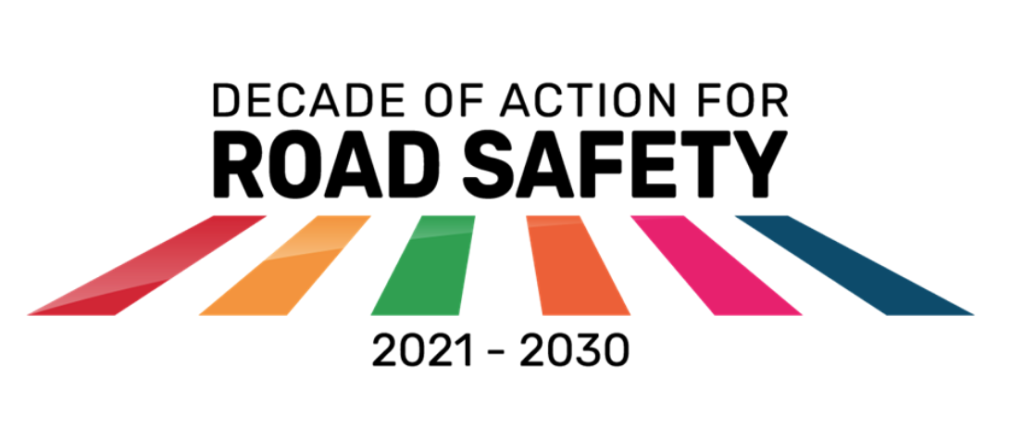
Story
03 February 2025
What is Peacekeeping?
Peacekeeping has proven to be one of the most effective tools available to the UN to assist host countries navigate the difficult path from conflict to peace. Peacekeeping has unique strengths, including legitimacy, burden sharing, and an ability to deploy and sustain troops and police from around the globe, integrating them with civilian peacekeepers to advance multidimensional mandates.UN peacekeepers provide security and the political and peacebuilding support to help countries make the difficult, early transition from conflict to peace.UN Peacekeeping is guided by three basic principles:Consent of the parties;Impartiality;Non-use of force except in self-defence and defence of the mandate.Peacekeeping is flexible and over the past two decades has been deployed in many configurations. There are currently 11 UN peacekeeping operations deployed on three continents.Today's multidimensional peacekeeping operations are called upon not only to maintain peace and security, but also to facilitate the political process, protect civilians, assist in the disarmament, demobilization, and reintegration of former combatants; support the organization of elections, protect and promote human rights and assist in restoring the rule of law.Success is never guaranteed, because UN Peacekeeping almost by definition goes to the most physically and politically difficult environments. However, we have built up a demonstrable record of success over our 70 years of existence, including winning the Nobel Peace Prize.Peacekeeping has always been highly dynamic and has evolved in the face of new challenges. Former Secretary-General Ban Ki-moon established a 17-member High-level Independent Panel on UN Peace Operations to make a comprehensive assessment of the state of UN peace operations today, and the emerging needs of the future.Global partnershipUN peacekeeping is a unique global partnership. It brings together the General Assembly, the Security Council, the Secretariat, troop and police contributors and the host governments in a combined effort to maintain international peace and security. Its strength lies in the legitimacy of the UN Charter and in the wide range of contributing countries that participate and provide precious resources.This part of the article was originally published on United Nations Peacekeeping' site through this link: What is Peacekeeping (https://peacekeeping.un.org/en/what-is-peacekeeping)UN Peacekeeping is the largest and most visible representation of the United Nations. It is a collective investment in global peace, security, and stability.This investment has a proven track record. Over 70 years, our peacekeepers have made a tangible difference in the lives of hundreds of millions of the world’s most vulnerable people, creating conditions for lasting peace, but a viable political process is central to the work of our operations, as peacekeeping is meant to support and not substitute national efforts. Peacekeeping, however, is political and its success depends on active and sustainable political processes or the real prospect of a peace process. Peacekeeping cannot substitute for the political will and determination of the parties to end the conflict and protect their people, nor the host state’s sovereign responsibilities.The Security Council has a vital role in securing this commitment and cooperation, while providing missions with realistic and clear mandates.Peacekeepers protect civilians, actively prevent conflict, reduce violence, strengthen security and empower national authorities to assume these responsibilities. This requires a coherent security and peacebuilding strategy that supports the political strategy. UN peacekeeping helps host countries to become more resilient to conflict, laying the groundwork to sustain long-term peace, including by addressing root causes of conflict.A strong an effective partnership between the UN Secretariat, the Security Council and the countries that contribute uniformed personnel, has made possible for 55 peacekeeping operations around the world to have, through the years, successfully completed their mandate. This partnership is essential as we continue to evolve, striving every day to become more agile and adapt to the volatile environments we operate in. UN peacekeeping is also committed to working smarter and using modern technology as well as other innovations.All of this allows our peacekeepers to: Protect civiliansPrevent conflictsBuild Rule of Law and security institutionsPromote human rightsEmpower womenDeliver field supportThis part of the article was originally published on United Nations Peacekeeping' site through this link: What We Do (https://peacekeeping.un.org/en/what-we-do), filtered_html
1 of 5

Story
13 January 2025
2024 in Numbers: UN in Indonesia edition
What a year it’s been! 2024 has been all about growth, collaboration, and making a real difference together. Thanks to all the incredible people across Indonesia, the UN in Indonesia was able to do so much this year. Here’s a look at the numbers that tell the story of an amazing journey featuring YOU.26 UN Agencies, 17 GoalsThis year, 26 different UN agencies worked side by side to make change happen. Together with the government, educational institutions, civil society organisations, media, private sector and stakeholders, we’ve been able to run impactful projects across Indonesia.Empowering youth of Indonesia Indonesia’s youth are the future, and we’ve been all in on empowering them. Thirty six visits from and to universities and youth organizations and connected with over 3,000 university students. That’s not all—13 school visits reached around 1,700 students.Celebrating together at 123 offline eventsWe brought 15,000+ participants together at 123 events, including over 8,200 youth. At the International Youth Day Event, 830 youth from across Indonesia step up to talk about how to leverage sustainable development in the country, proving that the next generation is ready to lead.2024 was also a year to celebrate. The UN Day exhibition brought in over 1,000 visitors, 3 iconic landmarks were lit in UN blue to shine a light on global cooperation, and 11 videotrons all over Jakarta displayed the message of the United Nations. Nine offline exhibitions welcomed over 21,000 visitors, including more than 3,000 youth. Special moments like the Children Literacy Festival, the International Day of Persons with Disabilities, Human Rights Day, and the Aceh Tsunami Commemoration brought over 3,400 people together to learn and reflect.One of the coolest things this year? The comic strip competition! Over 50 participants joined, sharing their creativity on themes like climate change, digital innovation, and global peace. 9 comics were chosen as winners, reminding us that change can start with something as simple as a story. Over 50 attendees gathered at blue-lit Monumen Nasional for the UN Day and admired the winning comics. Reaching millions digitallyWe’ve also been connecting with even more people online. Across social media and our website, the UN in Indonesia reached over 27 million people each month through posts, videos, or stories that resonate with people everywhere. But there’s more to it—over 5,000 news stories covered the UN’s activities in Indonesia, making sure our work was shared far and wide through mass media channels.Thank you for being part of our 2024 journeyCheck out the video to see the incredible journey of the UN in Indonesia in 2024! None of this would have been possible without YOU. Whether you attended an event, supported our work, or followed along from afar, you’ve helped us create a year to remember. Let’s keep the momentum going in 2025—there’s so much more to do.If you’re interested in visiting, collaborating or want to be part of the next chapter, reach out to us at unic-jakarta@un.org.Here’s to more change, more connections, and more impact in the year ahead! Happy New Year 2025, filtered_html
1 of 5
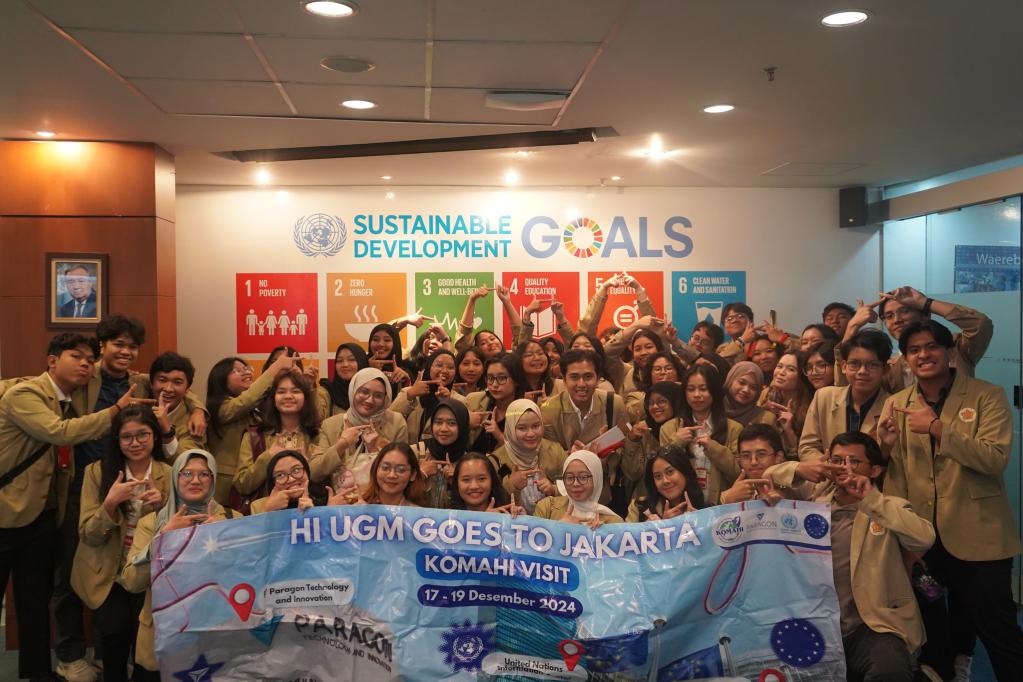
Story
09 December 2024
Uniting for Integrity: Empowering Stakeholders in the Fight Against Corruption
On today’s International Anti-Corruption Day, Putri Rahayu Wijayanti, UNODC Programme Coordinator, Anti-Corruption, shares her thoughts on broad anti-corruption efforts in Indonesia, supported by UNODCCorruption undermines societal foundations, impeding progress and depriving individuals of essential opportunities in education, healthcare, employment, and environmental sustainability. Addressing this pervasive issue requires the collective efforts of diverse stakeholders, including youth, persons with disabilities, civil society, and the private sector, to foster a fairer and more transparent future.Youth Engagement in Anti-Corruption EffortsWith approximately 1.9 billion young people globally, their involvement in anti-corruption initiatives is indispensable. Connected and informed like never before, youth possess innovative tools to combat corruption. By leveraging technologies such as artificial intelligence, social media, and blockchain, they can develop ground-breaking solutions, advocate for ethical practices, and demand greater accountability from institutions.In Indonesia, the United Nations Office on Drugs and Crime (UNODC) has actively engaged youth in anti-corruption efforts. Through a Video Competition organized by the Corruption Eradication Commission (KPK) and Tempo Institute, with support from UNODC, we worked with over 100 youth to create impactful videos promoting integrity. (Watch this video to learn more.) Inclusion of Persons with DisabilitiesEnsuring that anti-corruption initiatives are inclusive of persons with disabilities is crucial. UNODC emphasizes the importance of inclusivity in its programs, recognizing that diverse perspectives strengthen the fight against corruption. In collaboration with KPK, UNODC conducted workshops and public discussions that included persons with disabilities, providing accessible environments and sign language interpreters to ensure full participation. These activities empowered individuals with disabilities to understand the impact of corruption on their own lives and actively engage in anti-corruption efforts.By providing platforms for individuals with disabilities to participate in anti-corruption activities, societies can harness a wider range of experiences and ideas, leading to more effective and comprehensive strategies.Private Sector ParticipationThe private sector plays a crucial role in preventing corruption by promoting ethical practices, ensuring compliance with regulations, and fostering accountability. Through collective action and the implementation of robust anti-corruption policies, companies can contribute to a more transparent and responsible business environment, supporting long-term sustainability and growth.In Indonesia, UNODC has partnered with the private sector to combat corruption. For example, UNODC collaborated with the Indonesian Palm Oil Association (GAPKI) to promote transparency and integrity within the palm oil industry. This partnership aims to address corruption risks such as bribery, and regulatory violations, which hinder the industry's contribution to economic growth. (Watch this video to learn more.)Collective Action for a Corruption-Free FutureEngaging a wide variety of stakeholders in anti-corruption efforts is essential for creating a fair and transparent future. By empowering youth, including persons with disabilities, collaborating with civil society, and partnering with the private can develop comprehensive strategies to combat corruption., filtered_html
1 of 5
Story
03 December 2024
Cutting Carbon, Growing Savings: How UNIDO is Helping Indonesia’s Fertilizer Industry Slash Emissions
The United Nations Industrial Development Organization (UNIDO) is joining forces with the Indonesian Government and the fertilizer industry to lower the sector’s greenhouse gas emissions and help Indonesia meet its climate commitments.The cooperation, which is part of a joint United Nations programme, is in its pilot phase, but UNIDO’s technical assistance to the fertilizer industry has already led to reductions in greenhouse gases. Four companies involved in the pilot phase of the project have already avoided a total emission of 328,000 tonnes of CO2-equivalent per year compared to the 2018 baseline. As this technology gains wider adoption, the impact is set to grow significantly, potentially saving the industry around US$ 47 million through more resource-efficient production.PT Pupuk Sriwijaya (PUSRI) in Palembang, South Sumatra, is one of the pioneers in the implementation of the programme. Here is how they have lowered their emissions while at the same time decreasing production costs.In the midst of a spacious, sun-drenched industrial complex, a majestic scene unfolds – a towering structure adorned with intricate steaming machinery. Behold PUSRI’s patented 2B urea plant, designed to fight climate change by curbing greenhouse gas emissions. “PUSRI is fully committed to clean energy and innovation, but our progress had previously been hindered by lack of a clear guidance,” said Alfa Widyawan, Senior Vice President of Technology. “Thanks to a UN study, we can now get a glimpse of what PUSRI’s progress actually has been so far and how to improve further.” Towards resource efficiencyThat research, developed by the United Nations Partnership for Action on Green Economy (UN-PAGE) through UNIDO in close collaboration with the Ministry of National Development Planning (Bappenas) and the Indonesian Cleaner Production Centre (ICPC), is the Resource-Efficient and Cleaner Production (RECP) study. RECP is an integrated approach to enhance transparency in material and energy flows, leading to increased resource productivity, waste minimization, improved chemical management, optimized water use, and enhanced energy efficiency.Putting into use RECP practices in its urea plant, PUSRI has saved an average of 4,181 tonnes of CO2 equivalent per year compared to its 2018 baseline. This is equivalent to the annual emission of 844 vehicles. The company has also reduced water consumption from 13.5 m3/tonnes of urea produced to just 3.6 m3/tonnes, significantly below the green industry standard ceiling of 5.5 m3/tonnes of urea – leading to lower input costs. The benchmarking study used by PUSRI to launch these improvements was based on UNIDO’s 2019 Green Industry and Trade Assessment (GITA) report to strengthen the implementation of low-carbon development initiatives in Indonesia. It measures the country's industrial environmental performance in terms of air and water pollution, industrial waste, resource efficiency in the form of energy, water and material efficiency, as well as clean technology application in industrial production. PUSRI is actively pursuing low-carbon development by following the Indonesian Ministry of Industry's Green Industry Standard, and through the implementation of RECP practices.Industry accounts for around 14% of Indonesia’s greenhouse gas emissions, and the government set an ambitious target for the industrial sector to achieve net zero emissions by 2050.Globally, fertilizers are a major source of greenhouse gas emissions: manure and synthetic fertilizers emit the equivalent of 2.6 gigatonnes of carbon per year – more than global aviation and shipping combined. Towards Blue and Green AmmoniaPT Pupuk Indonesia, the parent company of PT Pupuk Sriwidjaja, is preparing to convert to blue ammonia and green ammonia production and further reduce greenhouse gas emissions as set out in its Blue and Green Ammonia 2030 Roadmap.Whether it can achieve it will partly depend on whether the company can access hundreds of megawatts of renewable energy to power its plants. The source and supply of renewable energy is still a challenge, Mr Widyawan said.UNIDO has assessed the environmental performance of the fertilizer industry in Indonesia, identifying resource efficiency opportunities, including through increased energy efficiency. “Following through with these recommendations industry-wide will help the country achieve its updated Nationally Determined Contribution (NDC) to reduce GHG emissions of the fertilizer industry by 3.95 million tonnes of CO2 equivalent by 2030,” said Marco Kamiya, UNIDO’s Representative for Indonesia and Timor Leste.To achieve this requires wide cooperation among stakeholders, he added: “Effective collaboration among corporations, government entities, and financial institutions is essential to establish sustainable funding avenues, ultimately expediting the adoption of resource-efficient and cleaner production techniques.”PAGE brings together the expertise and experience of five UN agencies to support Indonesia in green development. This partnership between the International Labour Organization (ILO), the United Nations Development Programme (UNDP), the United Nations Environment Programme (UNEP), UNIDO and the United Nations Institute for Training and Research (UNITAR). This article is first published at UNIDO's website on Cutting carbon, growing savings: How UNIDO helping Indonesia's fertilizer industry -- https://www.unido.org/news/cutting-carbon-growing-savings-how-unido-helping-indonesias-fertilizer-industry-slash-emissions, filtered_html
1 of 5
Press Release
04 February 2025
Asia-Pacific region to chart bold path for migration governance
Bangkok, 4 February 2025The second Regional Review of the Global Compact for Safe, Orderly and Regular Migration (GCM) in Asia and the Pacific opened today with a call for migration policies that prioritize the needs and rights of migrants while ensuring broad collaboration across governments, communities and key stakeholders. The region, home to over 40 per cent of the world’s international migrants, is witnessing significant shifts driven by demographic changes, rapid digital transformation and the increasing effects of climate change and other crises. Intraregional migration remains predominant, with 70 per cent of migrants moving within the region. Much of international migration is propelled by the search for decent work, with women migrants playing a critical yet often undervalued role in sectors such as care and domestic work. Children also make up a significant proportion of migrants in the region, with unique needs for services and protection due to their heightened vulnerability. “Migration, if managed in a well-informed, planned and voluntary manner, with full respect and protection of human rights, can bring benefits to all. Migrants should have their potential fully harnessed to play key roles in enhancing sustainable development in countries of origin and destination,” said Armida Salsiah Alisjahbana, United Nations Under-Secretary-General and Executive Secretary of the Economic and Social Commission for Asia and the Pacific (ESCAP) in her opening remarks. "With over 40 per cent of the world’s migrants calling Asia and the Pacific home, the region has a unique opportunity to lead by example—expanding regular pathways, protecting lives and ensuring migration benefits all," said Catalina Devandas, representing IOM Director General Amy Pope in her capacity as Coordinator of the UN Network on Migration. Expected outcomes and commitments Over the next three days, participants will share progress, challenges and good practices in implementing the 23 objectives of the GCM. Discussions will focus on the critical role of migrants in the region’s resilience and sustainable development, particularly in light of lessons learned during the COVID-19 pandemic.“In host countries, migrants bring with them not only the needed manpower, but also skills, expertise and social interactions, that can help accelerate economic and social development. Meanwhile, home countries can enjoy the economic boost from remittances from migrant workers and diaspora,” shared Eksiri Pintaruchi, Permanent Secretary for Foreign Affairs of Thailand. Speaking on behalf of the Stakeholder Action Group, migrant domestic worker and member of the International Domestic Workers Federation Nasrikah highlighted the importance of having segregated data on migration to inform policymakers on the key needs and situations of migrants and their families and take action based on analysis and true stories of unsafe migration. Recognizing the importance of addressing the interconnected challenges shaping migration dynamics such as rapid digital transformation, climate change, demographic shifts and economic disparities, several key commitments are expected to emerge from the review including:Protecting migrants’ rights and saving lives: Governments are expected to renew their commitments to policies that uphold migrants’ rights, promote gender equality, tackle discrimination and ensure access to health care, education, decent work and social protection for all migrants, including their children.Using technology to improve migration systems: Key priorities include reducing remittance transfer costs, promoting digital and financial inclusion, closing gender gaps in financial access, simplifying migration processes and increasing transparency.Preparing for crises and climate impacts: Governments are expected to recognize the need for migration policies that help migrants and communities better withstand climate change, economic shocks and health emergencies, using reliable, timely and disaggregated data.Strengthening regional cooperation: The meeting will highlight cross-border collaboration, stronger partnerships and meaningful engagement with migrants, civil society, women’s rights organizations and the private sector to improve migration governance.The outcomes of this meeting will contribute to global discussions at the 2026 International Migration Review Forum. Governments are also expected to reaffirm their commitment to aligning migration governance with the Sustainable Development Goals, recognizing that protecting all migrants and enabling their full contributions to society are essential to achieving the 2030 Agenda for Sustainable Development., filtered_html
1 of 5
Press Release
17 December 2024
New UN programme to support utilization and availability of data for development at the local level
National governments set overall economic and development objectives, but it is local authorities – closest to the people – who know best what it takes to accelerate progress towards the Sustainable Development Goals (SDGs) locally. This is why a United Nations in Indonesia joint programme, launched recently, is focusing on supporting local authorities – at the provincial, district and municipal level – through making available data at the local level for informed policymaking.“While governments design national policies and development frameworks, districts and municipalities have their finger on the pulse. They are therefore in a key position to assess challenges and implement development projects to respond to the needs of their population,” said Gita Sabharwal, United Nations Resident Coordinator in Indonesia. “This requires accurate and accessible data at the local level, and that is where support under this new programme will focus.”According to government data, Indonesia is on track to meet 62% of the SDG indicators, and the government is committed to accelerate progress in the areas that are furthest behind, including nutrition and gender equality. Development across the SDGs has been uneven, with major regional disparities. To accelerate efforts where it is the most needed requires tailored interventions, which in turn requires accurate data. However, data availability at the district and municipality level is limited, particularly data for socioeconomic SDG indicators. The new joint programme, with the participation of the World Food Programme (WFP), the United Nations Children Fund (UNICEF) and the United Nations Population Agency (UNFPA), will help develop a mechanism to provide more reliable data at the local level, using a modelling methodology known as small area estimation. It will also support the development of a national regulatory framework to strengthen local SDG planning, monitoring, evaluation and financing, and will also help create national guidelines and protocols to improve SDG availability and utilization at the local level.The online SDG Dashboard, developed by the Ministry of National Development Planning/National Development Planning Agency (BAPPENAS) and the UN in Indonesia, will be turned into a one-stop database and digital monitoring and evaluation system to analyse the progress on SDGs to strengthen local development plans, said Vivi Yulaswati, Deputy of Maritime Affairs and National Resources of BAPPPENAS. “With accurate data and exposure to best practice examples from across the country, we will provide governments at the subnational level with the ammunition they need to design and implement well-targeted programmes with a clear and measurable impact on development towards the SDGs,” she said. The new one-year programme is funded by Joint SDG Fund. It complements other initiatives by the UN in Indonesia to support sub-national governments in accelerating development towards the SDGs, such as support to Voluntary Local Reviews (VLRs). VLRs enable local and regional governments to assess their progress toward the SDGs and prioritize action based on the results. “By working together in complimentary ways, BAPPENAS and the UN can provide the support that subnational governments need to achieve meaningful and inclusive progress,” Ms Sabharwal said., filtered_html
1 of 5
Press Release
23 January 2025
Honoring the Rights of Persons with Disabilities Through Creative Arts
In celebration of the International Day of Persons with Disabilities on December 3 and Human Rights Day on December 10, the United Nations Information Center (UNIC) and the Office of the High Commissioner for Human Rights (OHCHR) are hosting “Our Rights, Our Future Film Tour.” The event, themed “Empowered Persons with Disabilities, Inclusivity for All,” showcases the resilience and creativity of persons with disabilities through film, art, and fashion, promoting inclusivity.Running from December 5 to 7, 2024, at Taman Ismail Marzuki in Jakarta, the programme includes screenings, art exhibitions, inclusive fashion shows, and workshops. Organized in partnership with Bumilangit, the United Nations Association of Indonesia (UNAI), and the International Labour Organization (ILO), the event also supports inclusive employment through the “Decent Work for All” campaign.“This event is about solutions, about celebrating humanity, and people with diverse sets of abilities and their creativity,” said Miklos Gaspar, Director of UNIC Jakarta. “Art and fashion as powerful mediums, and we invite the public to see that.”A highlight of the event is the screening of “Sundul Langit,” a film directed by a blind filmmaker with a script written by a deaf writer. It tells the story of a deaf student navigating an inclusive school. “This film is proof that every person has a story worth telling and the talent to tell it,” said Basuki from Sahabat Mata, the community behind the film. “Our hope is that it inspires others to see abilities rather than limitations.”Another key feature is the fashion show presented by the Layak Community, which showcases designs that empower persons with disabilities to express themselves with confidence. “Fashion is a universal language,” said XX from Layak. “Through inclusive design, we aim to redefine beauty and empower individuals to embrace their uniqueness.”Complementing these showcases, an art exhibition will display the work of artists with disabilities, celebrating their perspectives and contributions to creative expression. Workshops led by the ILO and APINDO will provide practical strategies for fostering inclusivity in workplaces, furthering the vision of equality and opportunity for all.“Through this initiative, we are inviting society to rethink its perceptions and embrace inclusivity,” Mr Gaspar said. “Art and fashion are powerful tools to spark conversations and inspire change.”, filtered_html
1 of 5
Press Release
29 October 2024
UN Day 2024 Youth Event Highlights Comics, Creativity and Global Cooperation
Jakarta, October 26, 2024Climate change, digitization and global peace are the topics of the three comics that won the youth competition organized by the United Nations Information Centre (UNIC) Jakarta, in collaboration with Bumilangit, an entertainment company in Indonesia that features Indonesian superheroes in their comics to commemorate United Nations Day, 24 October.The "Reshaping the Future" Youth Comic Competition encouraged young Indonesians to use comics as a medium for expressing their thoughts on global challenges. With Bumilangit superheroes as their inspiration, participants creatively explored issues that mattered most to their generation.Miklos Gaspar, UNIC Director, emphasized the importance of youth engagement through creative platforms: “Youth are not just the leaders of tomorrow but are making a difference already today. Initiatives like the comic competition provide a platform for young people to creatively engage with the world’s challenges, allowing them to express their ideas and envision out-of-the-box solutions. UNIC and our partners amplify these voices, as they hold keys to a more sustainable and peaceful future.”To award the winners and hold a discussion on global challenges and potential solution, UNIC, and the United Nations Association of (UNA) Indonesia hosted the UN Day 2024 celebration at National Monument (Monas) in Central Jakarta today. The event engaged the public through interactive activities and discussions on climate change, youth and digital innovation, and global cooperation and peace. At the heart of the discussions was the Pact for the Future, a new global treaty adopted by UN Member States last month, a landmark declaration pledging concrete actions towards a more peaceful and sustainable world for future generationsThe winners of the competition showcased their talent. Oei Alice Zita Kusuma, 20, from West Jakarta, depicted Sri Asih fighting crime in a city overwhelmed by floods and waste, highlighting the urgent issue of climate change and pollution. Mischa Sultana Salwa (16) from South Jakarta, focused on youth and digitalization, exploring both the benefits and drawbacks of technology use and with Virgo encouraging its responsible use. Ashley Maryam, 20, also from South Jakarta, centred her comic on global peace, featuring Si Buta, Sri Asih, and Virgo working together to promote cooperation and the role of all in building a peaceful world. Agung Rachmawan, Vice President of Bumilangit, highlighted the value of collaborating with young talents: “We were thrilled to partner with the UN in this effort. Using our superheroes to inspire youth to think critically about global issues aligned perfectly with Bumilangit’s mission to promote empowerment and inclusivity. This collaboration went beyond just comics; it was about giving young voices a platform to imagine, engage, and create a better future for everyone.”The UN Day celebration was designed to be more than just an event—it was a call to action for communities to come together, learn, and collaborate. Attendees participated in various interactive activities, such as "Networking Tarot," where they engaged in discussions about personal growth and careers using prompt cards. The "Vision Boards to the UN" activity allowed participants to express their hopes for the future through creative visual boards, while the "Letters to the UN" session offered a symbolic way for attendees to share their messages on plantable seed paper, signifying sustainability and growth.Bagas Jatikusuma, Secretary General of UNAI, emphasized the transformative role of creativity: “This event demonstrated how creativity can be a powerful tool for positive change. By engaging youth through art and dialogue, we fostered a generation that is not only aware of global challenges but also ready to take action.”For more information, please contact:Siska Widyawati
National Communication Officer, UNIC Jakarta
Phone: +62 878-8488-5489, filtered_html
National Communication Officer, UNIC Jakarta
Phone: +62 878-8488-5489, filtered_html
1 of 5
Press Release
24 October 2024
Government and the UN in Indonesia issue commemorative stamp on UN Day
Jakarta, 24 October 2024On today’s United Nations Day, the Ministry of Foreign Affairs of Indonesia, the Ministry of Communication and Digital, in partnership with the UN in Indonesia and Binus University, held a youth-focused event that celebrated the creativity and contributions of young Indonesians.
They announced the winners of a national stamp competition launched earlier this year for youth from across Indonesia to design a stamp symbolizing the partnership between Indonesia and the UN, as well as their shared commitment to sustainable development.
Today’s UN Day event, themed “Pact to the Future: Youth at the Heart of Change,” emphasized the role of young people in promoting innovation, peace, and sustainability. The programme included interactive workshops, youth-led discussions, and cultural performances, all aimed at encouraging youth engagement in creating a positive future.
The Senior Advisor to the Minister for Political, Legal, and Security Affairs, Ministry of Foreign Affairs of the Republic of Indonesia, His Excellency Adam Mulawarman Tugio, on his keynote speech, expressed the importance of youth participation, stating, “Young people are essential to Indonesia’s development and our efforts to achieve the SDGs. Their creativity and ideas are crucial as we work towards peacebuilding, sustainable development, and technological advancement. The stamp launched today is a symbol of their contributions and the strong partnership between Indonesia and the United Nations.”
He added that “the partnership between our government and the UN showcases the importance of multilateral cooperation, particularly in empowering our youth to be active contributors to sustainable development.”
The stamp competition was organized by the Ministry of Foreign Affairs, the Ministry of Communication and Digital, and the UN in Indonesia. The first winner, Armelsa Ferdinandus (18) from Jakarta, the second-place winner, Rice Anggraini (18) from Bengkulu, and the third-place winner, Revant Marlun (15) from Jakarta, received their awards as part of the festivities.
The event also featured a special session led by youth representatives who shared their stories and ideas on how they are driving positive change in their communities. This dialogue emphasized the importance of inclusive and youth-led initiatives in achieving sustainable development and demonstrated the power of collaboration between the government, international organizations, and youth groups.
“Young people are key to shaping a more inclusive and sustainable future. The United Nations is committed to working alongside Indonesia’s youth to support their innovative contributions and ideas. This event and the stamp competition showcase the incredible potential of Indonesia’s young generation,” said Gita Sabharwal, the UN Resident Coordinator in Indonesia.
The event also introduced the “SDG Time Capsule,” inviting participants to contribute messages about their hopes for 2030, symbolizing a collective vision of a sustainable future, sealed until the end of the decade.
Dr. Nelly S. Kom, MM, CSCA, Rector of BINUS University, added: “This year’s event theme, Youthnovation, resonates with the need for inclusive initiatives led by young people in driving innovation for achieving sustainable development through their creative spirit, fresh thinking, and transformative actions in shaping Indonesia’s future. This is important to us, equipping students to be change makers and future leaders”
The UN Day celebration featured cultural performances, exhibits from UN agencies, and displays by private sector partners, highlighting solutions for sustainable development in Indonesia, filtered_html
They announced the winners of a national stamp competition launched earlier this year for youth from across Indonesia to design a stamp symbolizing the partnership between Indonesia and the UN, as well as their shared commitment to sustainable development.
Today’s UN Day event, themed “Pact to the Future: Youth at the Heart of Change,” emphasized the role of young people in promoting innovation, peace, and sustainability. The programme included interactive workshops, youth-led discussions, and cultural performances, all aimed at encouraging youth engagement in creating a positive future.
The Senior Advisor to the Minister for Political, Legal, and Security Affairs, Ministry of Foreign Affairs of the Republic of Indonesia, His Excellency Adam Mulawarman Tugio, on his keynote speech, expressed the importance of youth participation, stating, “Young people are essential to Indonesia’s development and our efforts to achieve the SDGs. Their creativity and ideas are crucial as we work towards peacebuilding, sustainable development, and technological advancement. The stamp launched today is a symbol of their contributions and the strong partnership between Indonesia and the United Nations.”
He added that “the partnership between our government and the UN showcases the importance of multilateral cooperation, particularly in empowering our youth to be active contributors to sustainable development.”
The stamp competition was organized by the Ministry of Foreign Affairs, the Ministry of Communication and Digital, and the UN in Indonesia. The first winner, Armelsa Ferdinandus (18) from Jakarta, the second-place winner, Rice Anggraini (18) from Bengkulu, and the third-place winner, Revant Marlun (15) from Jakarta, received their awards as part of the festivities.
The event also featured a special session led by youth representatives who shared their stories and ideas on how they are driving positive change in their communities. This dialogue emphasized the importance of inclusive and youth-led initiatives in achieving sustainable development and demonstrated the power of collaboration between the government, international organizations, and youth groups.
“Young people are key to shaping a more inclusive and sustainable future. The United Nations is committed to working alongside Indonesia’s youth to support their innovative contributions and ideas. This event and the stamp competition showcase the incredible potential of Indonesia’s young generation,” said Gita Sabharwal, the UN Resident Coordinator in Indonesia.
The event also introduced the “SDG Time Capsule,” inviting participants to contribute messages about their hopes for 2030, symbolizing a collective vision of a sustainable future, sealed until the end of the decade.
Dr. Nelly S. Kom, MM, CSCA, Rector of BINUS University, added: “This year’s event theme, Youthnovation, resonates with the need for inclusive initiatives led by young people in driving innovation for achieving sustainable development through their creative spirit, fresh thinking, and transformative actions in shaping Indonesia’s future. This is important to us, equipping students to be change makers and future leaders”
The UN Day celebration featured cultural performances, exhibits from UN agencies, and displays by private sector partners, highlighting solutions for sustainable development in Indonesia, filtered_html
1 of 5
Latest Resources
1 / 11
Resources
18 July 2024
1 / 11

























